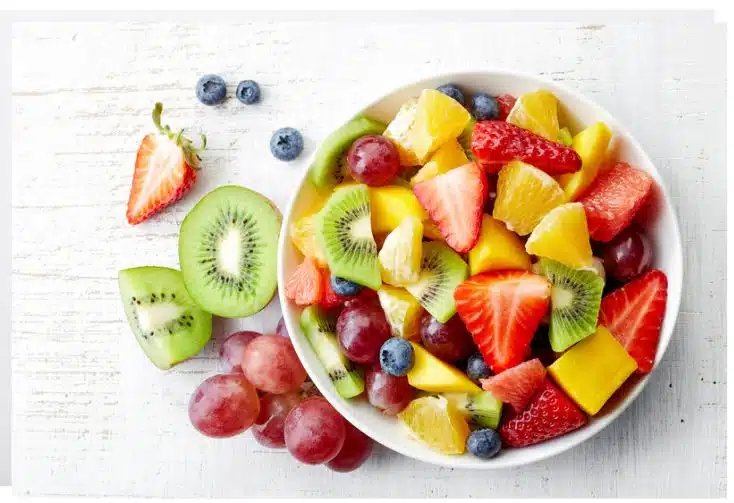The Fruits We Should Consider Eating As We Age

Often, aging is presented as a necessary evil. Maybe that’s fair, maybe not.
What’s far less debatable is that getting older certainly beats the alternative.
Given this, the best a person can do as they transition into their golden years is to try and do so gracefully.
One of the most significant factors in maintaining optimal health and vitality as we age is a balanced diet, especially one that’s loaded with fruits.
Full of essential vitamins, minerals, and antioxidants, fruits are a natural wonder that can help slow the aging process.
Today, we’re examining the best fruits for seniors to help battle old age and offering up a few tips on how to easily add them to your regular diet.
How Nutrition Evolves with Age
Our nutritional needs change as we progress through life.
This is because, as our bodies get older, our metabolism tends to slow down, muscle mass begins to diminish, and brain function begins to decline.
If these changes are inevitable, the best thing to do is embrace the fight to maintain well-being and vitality in our later years.
In addition to exercises that help to maintain physical and cognitive health, a thoughtful approach to nutrition is crucial. It’s important to understand that certain nutrients are particularly crucial for older adults.
For instance, protein is key to preserving muscle mass and strength. Calcium and vitamin D are central to maintaining healthy bones and preventing osteoporosis.
Potassium can help maintain healthy blood pressure levels. Fiber and vitamins B12 and C help to fight inflammation and oxidative stress and support healthy immune and digestive systems. The list goes on.
As we’re going to learn, a diet rich in fruits is vital to meeting these nutritional needs.
Fortunately, fruits offer a delicious and easy way to ensure that all of these essential body- and brain-healthy vitamins, minerals, and antioxidants are featured in your diet!

Why You Should Eat More Fruit When You’re Older
Fruit helps our bodies and minds remain in peak condition as we age. Why?
Firstly, many fruits are rich in all-important antioxidants, which support strong cognitive function and memory by combating oxidative stress and inflammation.
Secondly, fruits provide dietary fiber, which promotes gut health and prevents issues like constipation, both of which can be vital for older adults, as digestion tends to slow with age.
Additionally, vitamins A, C, and E, commonly found in a variety of fruits, are renowned for providing all-natural protection for the skin.
These vitamins, by protecting against harmful UV rays, improve texture, reduce the appearance of wrinkles, and leave the skin with a healthy, youthful, and radiant glow.
Numerous research studies have identified the health benefits of fruits for older adults, with experts highlighting their positive impact on cardiovascular, bone, cognitive, and immune system health.
How to Easily Eat More Fruit
Whether your preference is fresh, frozen, or canned, incorporating more fruits into your daily diet is both effortless and delicious.
When selecting fresh fruits, there are a few things to keep in mind. At the store identifying ripe, fragrant fruits is key. Once you’ve gotten your fruit home, store them properly.
Put berries & cherries in the refrigerator and bananas & apples in a cool, shaded place to preserve the flavor & nutritional value.
As for eating more fruit, it’s never been easier.
While there’s absolutely nothing wrong with cutting them up or simply picking them up and taking a bite, you can explore several creative avenues.
For instance, add fresh or frozen berries to your morning cereal or oatmeal. Those same berries, plus bananas, mangoes, peaches, and more, make for some delicious smoothies.
Also, toss sliced fruits like apples, pears, or berries, into salads for a healthy burst of natural sweetness.
Individuals suffering from dental issues will want to consider softer fruits like ripe pears, sliced peaches, or melons, or opt for organic juices that provide the same health benefits without the difficulty of chewing.
Best Fruits for Older Adults
- Apples
Apples are a nutritional powerhouse, especially for older adults & seniors.
They’re packed with dietary fiber that promotes digestive health and soluble fiber that helps regulate blood sugar levels. Furthermore, apples are loaded with antioxidants, which are vital in supporting cellular health.
Apples are notoriously difficult to take a bite out of, especially if you have dentures or another type of dental implant.
But you can easily slice them into smaller, more manageable pieces or enjoy them as applesauce.
If you’re feeling more adventurous, consider blending apples into smoothies, or baking them with a dash of cinnamon for a healthy and delicious dessert.
- Blueberries
A true superfruit, blueberries are exceptionally beneficial for older adults. These tiny health bombs are loaded with antioxidants known for their anti-inflammatory and cell-protecting properties and, according to recent studies, benefits to cognitive function and memory in seniors.
Add blueberries to oatmeal, cereal, or yogurt, blend them into smoothies, or simply pour some into a bowl and eat them like candy!
- Oranges
We all know that the abundance of vitamin C in oranges helps boost immune system health and overall well-being. As important as this is for everyone, it’s especially vital for seniors, who need stronger defense against infection.
Additionally, oranges have a high water content, which helps older adults stay properly hydrated
Start your day with a glass of freshly squeezed orange juice or simply peel and enjoy the bright, citric burst of a perfectly-ripe orange as a snack.
Also, oranges (and other citrus fruits, like tangerines) pair well with salads, blend nicely into smoothies, and, with their outer zest, add a delightful zing to a variety of dishes.
- Bananas
Bananas are another delicious fruit for older adults. The potassium in bananas supports heart health by regulating blood pressure and reducing the risk of stroke.
Meanwhile, the abundance of vitamin B6 enhances brain function and cognitive health.
Slice bananas into cereal, oatmeal, or yogurt, blend them into a flavor-dense smoothie, add them to pancakes or banana bread, or simply enjoy as a quick & convenient snack.
- Avocados
Another nutritional treasure trove, avocados offer seniors a remarkable array of health benefits.
First, they are rich in healthy monounsaturated fats, which are excellent for cardiovascular health, promote healthy cholesterol levels, and reduce the risk of heart disease.
Additionally, high-fiber avocados are great for proper digestion and a healthy gut.
Whether you’re spreading slices on whole-grain toast for breakfast, adding them to salads for their creaminess and flavor, making delicious guacamole, or even blending them into smoothies, avocados integrate seamlessly into countless meals and snacks.
Adopting a fruit-heavy diet in these golden years will deliver a comprehensive array of health benefits.
The essential vitamins, minerals, antioxidants, and fiber found in fruits are important to maintaining cardiovascular, bone, cognitive, digestive, and immune system health!





